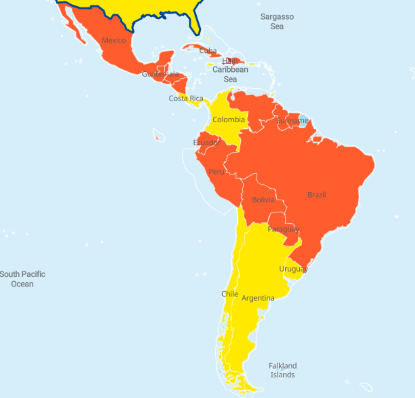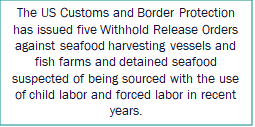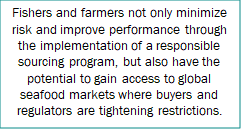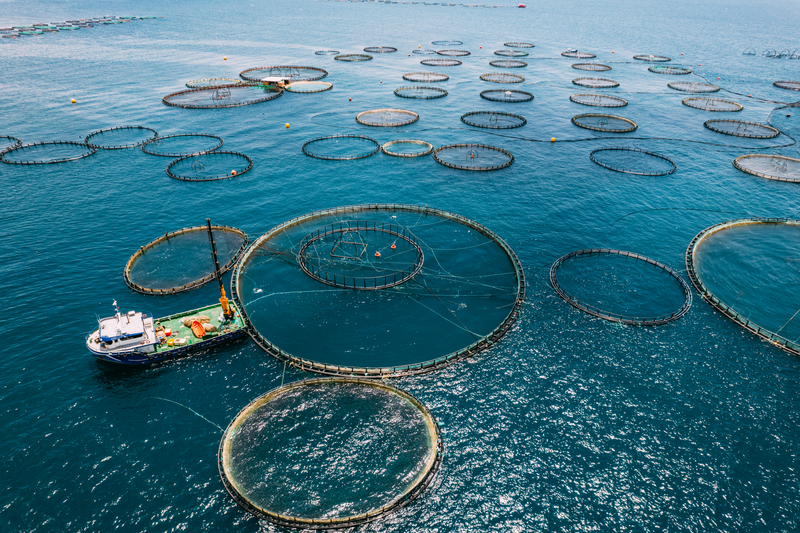Companies sourcing fish in Latin America and the Caribbean (LAC) urgently need to tackle environmental, social, and human rights adverse impacts in their value chains amid the legal, financial, and reputational risks.
The rise of illegal, unreported, and unregulated (IUU) fishing in Latin America and the Caribbean (LAC) is impacting fisheries and increasing their exposure to human rights and environmental risks. There is growing evidence from the Food and Agriculture Organisation (FAO) that migrants who work on foreign vessels, artisanal fishers, and women who work in fish processing plants in the region are vulnerable to labour exploitation. The Financial Transparency Coalition reported that more than 11% of the vessels accused of forced labour violations operated in the LAC region.
Shrimp and salmon in Latin America are among the top ten commodities produced with the most child and forced labour violations, according to the U.S. Department of Labour's 2020 List of Commodities Produced by Child Labour or Forced Labour.
Some exporting countries such as Ecuador, Colombia, Peru, Brazil, and Belize, showed extreme levels of ESG risk in our EiQ platform, which leverages audit data and civil society research to conduct risk analysis on sourcing regions and suppliers. This indicates critical violations occurred during onsite assessments in these markets. EiQ shows the top ESG risks identified in the region are:
- Forced labour and child labour.
- Consumer safety compromised by seafood fraud and mislabeling.
- Pollution affecting ecosystems.
- Precarious working conditions on seafood farms and in seafood processing plants that pay workers less than a living wage.

These high levels of social and environmental risk affect the fish and aquaculture sectors’ ability to continue to operate in a sustainable and profitable way unless they are clearly understood, identified, and addressed.
![]()
Source: Aquaculture and Seafood Supply Chain ESG Risk. EIQ
While governments in Latin America and the Caribbean have taken steps to address the problem, challenges persist. Laws and regulation enforcement fail to protect workers; governments lack the capacity and resources to address labour abuses; and there is weak coordination among government agencies, employers, workers' organizations, fishers, and other stakeholders to promote decent work in the fishing sector.
Seafood production in LAC could expose brands and retailers to unmanaged supply chain risks.
What can you do?

Companies sourcing fish in LAC should implement due diligence best practices at the base of the supply chain where sustainability risks are concentrated. While all suppliers should be subject to some level of due diligence, companies may choose to conduct a more detailed due diligence process on certain suppliers, depending on the level of risk associated with different relationships.
Companies are responding by announcing their commitments to addressing social, human rights and environmental risks. But many still rely on certifications which are not enough when complying with due diligence regulations and international standards.

We recommend that companies seeking to manage risk strive to understand their operational maturity for implementing a robust responsible sourcing programme aligned with due diligence standards and regulations. This should begin with a review of existing supplier codes of conduct to ensure their adequacy in addressing human rights and environmental risks of both direct and indirect suppliers, as well as establish internal processes to track their commitments' effectiveness, such as periodic audits and site visits.
LRQA is here to help
As your assurance partner, we’ll be relentless in helping you respond to this new era of risk. The LRQA Sustainability team possesses in-depth knowledge about the characteristics of each segment of the seafood and aquaculture value chain.
Our consulting team located in Latin America will combine their global perspective with local knowledge to help your business thrive, comply with local regulations, and mitigate supply chain risks. If you want to know more about how we can help you manage your Social and Environmental Due Diligence process, do not hesitate to contact us.









